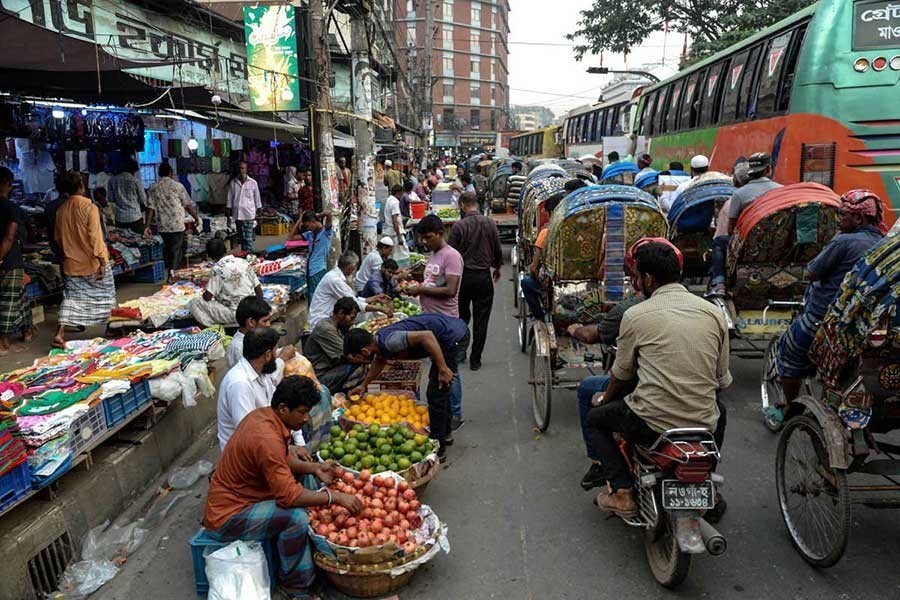Getting rid of the makeshift vendors' illegal occupation of various parts of streets in different neighbourhoods in Dhaka seems to be almost impossible. From morning to evening, thousands of street vendors occupy one or both sides of the roads, mostly with vans and small benches. As a result, the actual width of the streets gets narrowed, creating undue congestion and making the movement of pedestrians and vehicles difficult. Moreover, local business establishments also face trouble due to street vendors' day-long and evening presence. Finally, the makeshift street vending creates various inconveniences to local residents.
It is sad to note that the two city corporations in Dhaka, responsible for their citizens' smooth stay and movement, have failed to address the problem. Instead, it is alleged that illegal road and street encroachment is backed by several councillors and local leaders. What is also an 'open secret' is that a number of members of law enforcement agency have joined the local political leaders. The nexus of the trio is active there to collect illegal tolls from the vendors daily. According to a report published in a leading vernacular daily last month, some 300,000 hawkers or street vendors in Dhaka, on an average, pay Tk 200 daily as tolls to get permission for illegal vending on roads and streets. Thus, an estimated amount of Tk 60 million per day and Tk 1.80 billion per month is collected from the hawkers by several powerful extortionist gangs. The money extorted from the vendors is distributed among some political leaders and activists, local goons and police.
As the street vendors pay for the illegal encroachment, they could not care less for the residents' convenience. They know that the extortionists will protect them against legal or social action. Local residents tried to keep the streets free from vendors in some areas. They, however, backtracked due to non-cooperation from law enforcement agencies. Instead, in a few cases, local political leaders and extortionists threatened the residents with dire consequences.
Street vendors have made the movements of daily commuters difficult, especially in busy areas and pick times. Office-goers, students and others have to navigate through lousy traffic and congestion due to streets occupied by the vendors. In some area, congestions at intersections are more as vendors set up their stalls on main roads, too, creating bottlenecks. The designated shops and marketplaces in localities have also been affected badly due to illegal street vendors.
Residents and pedestrians also cannot avoid their responsibilities as they have generated demand for street vendors. Many people now prefer purchasing vegetables, fruits and other kitchen items from street vendors instead of going to nearby markets. Even fishes and chickens are also available on the streets, and many are purchasing those. Thus the streets become chaotic mainly during the evening when people return from work or office.
The continuous presence of street vendors also pollutes the surrounding areas. Waste papers and left-over are disposed of on the streets. In some areas, however, city corporation cleaners remove the waste properly. Again, these vendors and some others urinate openly on the street sides as no public toilet is available there. It has become a severe problem in many areas, and nobody bothers to address it.
Some argue that street vendors are poor people who need space to do small business. It is flawed logic. Poor people deserve some support for their livelihoods. However, it does not mean they have to resort to illegal practices, creating trouble for many others. Moreover, it is the nexus of extortionists which is ultimately benefiting from street vending. Therefore, enforcement of the rule of law is necessary to stop illegal extortion.


